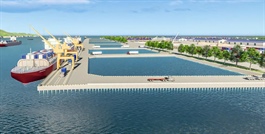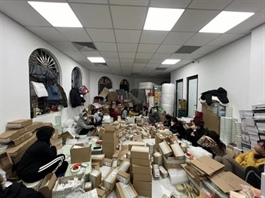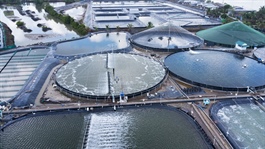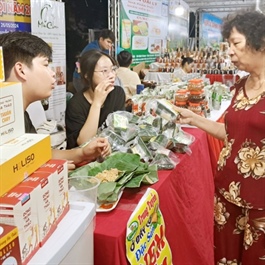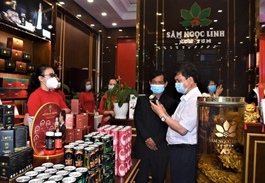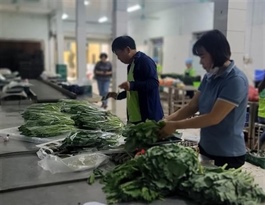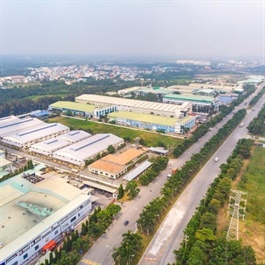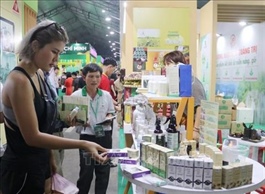Businesses in Vietnam boost production of recycled goods
Businesses in Vietnam boost production of recycled goods
Many businesses in Vietnam are increasing the production and export of recycled products to meet the growing trend of using eco-friendly products in both the domestic and international markets.
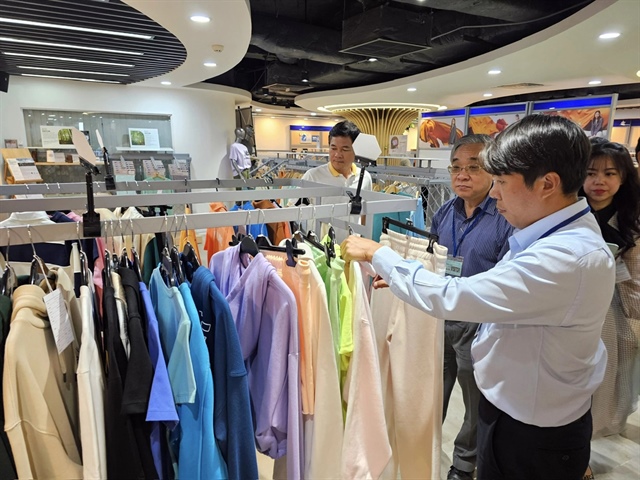
Clothes made out of recycled fabric at Thanh Cong Textile Garment - Investment - Trading JSC. in Ho Chi Minh City. Photo: Ngoc Hien / Tuoi Tre |
Besides designing and producing recycled clothing for its own market, the Thanh Cong Textile Garment - Investment - Trading JSC in Tan Phu District, Ho Chi Minh City also takes orders for recycled products from its partners from the U.S., the EU and Japan.
Businesses in the beverage industry are also joining the run by using more recycled items.
A representative from Swiss food and drink processing conglomerate Nestlé in Vietnam said that it has converted from plastic straws to paper straws on its milk products, even though paper straws are three times more expensive than plastic ones.
Chinese aseptic packaging manufacturer Lamipak said it will introduce non-aluminum coated milk cartons, making milk cartons much easier to recycle than normal milk cartons.
In addition, the enterprise also supplies unbleached milk cartons that are easy to decompose, as well as cartons that use less chemical ink for businesses.
Meanwhile in the construction material industry, Jacobo Perez Polaino, general manager of Sika Vietnam, said that the Swiss business is using containers made from recycled plastic and reclaiming some products to reuse.
"Even pallets are collected, classified, and repaired before continuing to be used for future shipments," Polaino said.
Pricing challenge
However, in order to put more recycled goods on store shelves, businesses are facing a challenge of manufacturing cost and price, as green products always fetch higher prices than conventional products.
According to Tran Nhu Tung, chairman of the board of Thanh Cong Textile Garment - Investment - Trading JSC, clothing products made from recycled materials are trendy around the world but the level of consumption is still modest compared to traditional materials.
Revenue from recycled products accounts for about 20 to 30 percent of the total revenue for the enterprise.
Tung named the high price the barrier for recycled products, with them fetching 10 to 20 percent more than ordinary items.
Furthermore, the machinery and equipment required to produce recycled goods also cost more than conventional machinery.
"The world economy is still in a difficult place, so price still plays an important role in consumers' shopping decisions,” Tung said.
Another challenge is that Vietnamese businesses are not proactive in their material sources and have to import recycled and green materials.
However, Tung believes it is a positive sign that there are customers who are willing to pay more to buy eco-friendly products.
Khuat Quang Hung, director of external affairs and communication at Nestlé Vietnam, said that although the cost of producing paper straws is three times higher than plastic straws, his enterprise wants to ensure that replacing the straws does not change its product prices.
According to Hung, his company does not pay too much attention to short-term economic problems, and they want to change consumer habits with green products.
Meanwhile, Le Tam Khoi, Lamipak’s Asia-Pacific regional head of marketing, said the price of non-aluminum coated milk cartons and unbleached milk cartons are respectively 12 and 19 percent higher than regular milk cartons.
According to Khoi, despite applying advanced technology and using effective materials, the production of eco-friendly paper boxes is still only small-scale with sporadic orders.
This pushes product prices up, making it difficult to compete with mass-market products.
“Only big enterprises can bear this huge cost, but they only order very small quantities because the number of products sold is insignificant compared to regular products due to price constraints," Khoi said.
Le Anh, director of sustainable development of Vietnam's Duy Tan Recycling Corporation, said the cost of recycled plastic is about 25 to 35 percent higher than virgin plastic depending on the product's use.
Recycled plastic used for food is priced the highest.
In fact, despite starting production in 2021, Duy Tan is still running at a loss, and there were occasions when there was so much inventory that the company had to temporarily suspend its recycling factory operations.
However, more and more of the world's leading brands are interested in and want to purchase large orders for recycled plastic products, Anh said.
The commitments for a greener environment
Besides producing recycled products, businesses are also making efforts to improve their process and collaborate with partners to reduce emissions and increase product recycling.
Dutch multinational dairy cooperative FrieslandCampina in Vietnam signed a cooperation agreement with Dong Tien Packaging and Paper Co. Ltd. and Truong Thinh Construction Investment & Trading JSC. to commit to recycling 100 percent of its packaging waste by 2030.
Richard Kiger, general director of FrieslandCampina Vietnam, said this is a pioneering step of the business in implementing the extended producer responsibility (EPR).
Meanwhile, Binu Jacob, CEO of Nestlé Vietnam, said the company is committed to reducing emissions by 20 percent by 2025, and by 50 percent by 2030, to reach net zero emission by 2050.
In 2023, the company reduced emissions by 13.58 percent thanks to efforts to change its production process, including increasing the use of recycled products.
General manager of Sika Vietnam Jacobo Perez Polaino added that the enterprise is committed to reducing greenhouse gas emissions by 20 percent, as well as reducing natural resources by 15 percent in waste treatment and the amount of water discharged per ton of goods sold.
In Vietnam, Sika has also committed to accompany the government in bringing net emissions to zero in 2050.



